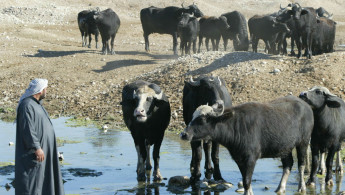Syrian livestock smugglers ruffling feathers in Iraqi Kurdistan
Syrian cattle and sheep smugglers are causing an economic crisis for Kurdish farmers in northern Iraq and putting local livestock at risk of disease, Erbil has said.
Around 2,000 heads of livestock are smuggled into Iraq's Kurdistan region every day, Kurdish officials have said, most coming from southern and central Syria.
Kurdish officials and farmers told Ruwad that the situation is driving down the price of cattle in the territories, and a lack of regulation is putting human and animals lives at risk.
"These livestock can very easily endanger public health, and they could also spread diseases among livestock in the Kurdistan region and elsewhere in Iraq," Ramadan Muhammad, an official at the ministry of agriculture, told Ruwad.
Iraq has suffered from an acute shortage of livestock over the past years, and farmers have been unable to meet demand leading to the spiralling cost of meat.
Erbil has allowed imports from Turkey to meet demand although smugglers in Syria have spotted an opportunity and started bringing in livestock over the border.
"In 2015, we had some 87,000 livestock imported through our northern border gates [from Turkey]," Muhammad said.
"During the same period, we have knowledge that over 2,000 cattle have been smuggled from Syria on a daily basis, which we have no control over."
Most of the produce is then transported into other areas of Iraq, which Erbil said could threaten livestock in other parts of the country.
"I'm afraid these livestock have not been vaccinated in Syria because of the war," Muhammad said.
One Kurdish trader was happier with the situation and told Ruwad that Syrian smugglers have "saved domestic livestock from extinction".
"Local producers were unable to meet demand... I think most Kurdish stock would have been butchered by now."





 Follow the Middle East's top stories in English at The New Arab on Google News
Follow the Middle East's top stories in English at The New Arab on Google News


